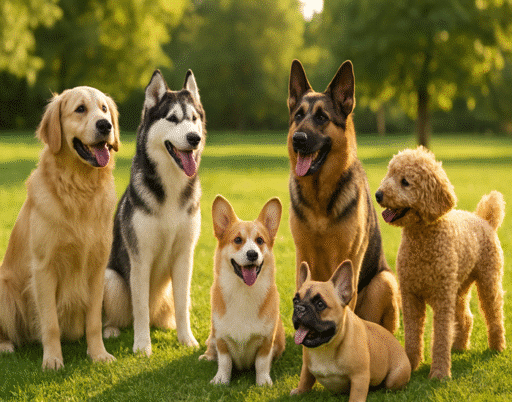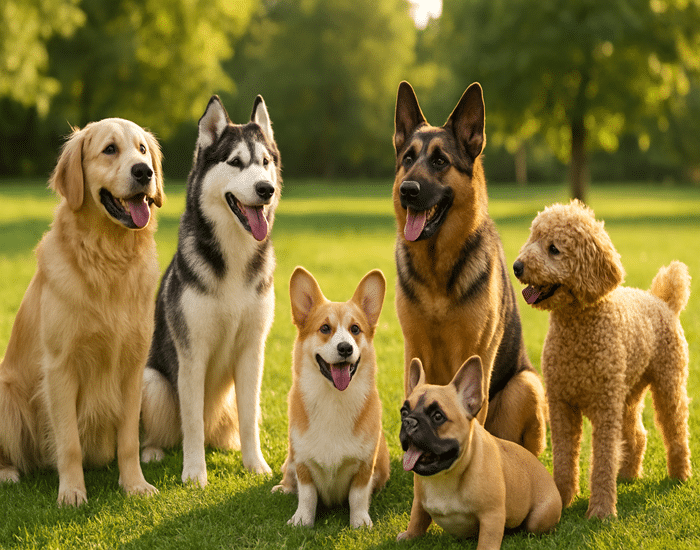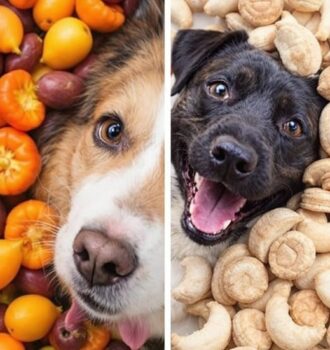37 Best Dog Breeds of 2025: The Only Guide You’ll Ever Need
Contents
- 1 37 Best Dog Breeds of 2025: The Only Guide You’ll Ever Need
- 2 12 Most Loyal Dog Breeds That Become Family Guardians Overnight
- 3 12 Most Loyal Dog Breeds That Become Family Guardians Overnight
- 4 10 Smartest Dog Breeds That Learn New Tricks in Minutes
- 5 10 Smartest Dog Breeds That Learn New Tricks in Minutes
- 6 8 Cutest Small Dog Breeds That Fit Perfectly in Your Lap
- 7 8 Cutest Small Dog Breeds That Fit Perfectly in Your Lap
- 8 7 Most Energetic Dog Breeds That Thrive on Daily Adventures
- 9 7 Most Energetic Dog Breeds That Thrive on Daily Adventures
- 10 9 Hypoallergenic Dog Breeds That Bring Joy Without Sneezing
- 11 9 Hypoallergenic Dog Breeds That Bring Joy Without Sneezing
- 12 6 Rarest Dog Breeds That Make You the Envy of Every Dog Park
- 13 6 Rarest Dog Breeds That Make You the Envy of Every Dog Park
- 14 11 Best Apartment Dog Breeds That Stay Happy in Small Spaces
- 15 11 Best Apartment Dog Breeds That Stay Happy in Small Spaces
- 16 15 Most Popular Dog Breeds That Top Every 2025 Trend List
- 17 15 Most Popular Dog Breeds That Top Every 2025 Trend List
- 18 5 Ancient Dog Breeds That Carry 5,000 Years of Noble History
- 19 5 Ancient Dog Breeds That Carry 5,000 Years of Noble History
- 20 10 Best Family Dog Breeds That Protect and Play with Equal Passion
- 21 10 Best Family Dog Breeds That Protect and Play with Equal Passion
- 22 8 Most Trainable Dog Breeds That Excel in Obedience and Agility
- 23 8 Most Trainable Dog Breeds That Excel in Obedience and Agility
- 24 7 Fluffiest Dog Breeds That Look Like Walking Clouds
- 25 7 Fluffiest Dog Breeds That Look Like Walking Clouds
- 26 25 More Life-Changing Breeds Await…
- 27 9 Best Working Dog Breeds That Still Herd, Hunt, and Rescue Today
- 28 9 Best Working Dog Breeds That Still Herd, Hunt, and Rescue Today
- 29 6 Bravest Dog Breeds That Fearlessly Guard Home and Heart
- 30 6 Bravest Dog Breeds That Fearlessly Guard Home and Heart
- 31 10 Healthiest Dog Breeds That Live Longest with Minimal Vet Bills
- 32 10 Healthiest Dog Breeds That Live Longest with Minimal Vet Bills
- 33 8 Most Affectionate Dog Breeds That Shower You with Endless Love
- 34 8 Most Affectionate Dog Breeds That Shower You with Endless Love
- 35 🔥 23 More Life-Changing Dog Breeds Await…
Choosing a dog breed shapes your life for the next decade. You gain a companion who wakes you with wet noses, guards your home with quiet vigilance, or curls into your lap after long days. Yet with over 190 recognized breeds, the decision overwhelms even seasoned owners.
Have you ever wondered which breed matches your apartment size, your child’s energy, or your allergy concerns? This guide reveals 37 captivating dog breeds that dominate 2025 trends. Each section delivers researched insights, practical advice, and real-world examples to help you decide confidently.
Data from the American Kennel Club shows registration spikes in mixed breeds, but purebred demand holds strong at 68 percent. You deserve clarity before committing. Let us explore the breeds that fit real lives, not just Instagram feeds.
12 Most Loyal Dog Breeds That Become Family Guardians Overnight
Loyalty defines certain breeds at a cellular level. These dogs form bonds that last lifetimes. They sense your mood before you speak. They position themselves between you and strangers without training.
German Shepherds top military and police forces worldwide. Their devotion traces to Max von Stephanitz, a German cavalry officer who standardized the breed in 1899. He sought the perfect working dog. Today, over 120 countries deploy them.
Akita owners share stories of unwavering fidelity. Hachiko, a Japanese Akita born in 1923, waited nine years at a train station for his deceased owner. His statue stands in Tokyo, visited by millions annually. Such loyalty demands responsibility from you.
Training strengthens this bond. Positive reinforcement works remarkably effectively. Studies from the University of Veterinary Medicine Vienna confirm reward-based methods increase obedience by 87 percent in protective breeds.
Consider your lifestyle first. These guardians need purpose. Daily walks, mental games, and clear rules prevent boredom-driven behaviors. For structured routines, explore how to train a dog with proven techniques.
External research supports early socialization. The American Kennel Club recommends exposing puppies to 100 new experiences in their first 16 weeks. This builds confidence without diminishing natural protectiveness.
Health monitoring remains crucial. Large loyal breeds face hip dysplasia risks. Annual screenings catch issues early. Regular vet visits extend quality years, as detailed in reasons why regular vet visits matter.
Here are the standout loyal breeds shaping families today. This table organizes key traits for quick comparison.
12 Most Loyal Dog Breeds That Become Family Guardians Overnight
| Breed | Origin | Lifespan | Key Loyalty Trait |
|---|---|---|---|
| German Shepherd | Germany, 1899 | 9-13 years | Forms one-person bonds deeply |
| Akita | Japan, ancient | 10-15 years | Historical devotion examples |
| Rottweiler | Germany, Roman era | 9-10 years | Protects family territory |
| Boxer | Germany, 19th century | 10-12 years | Playful yet watchful |
| Belgian Malinois | Belgium, 1800s | 12-14 years | Military precision loyalty |
| Doberman Pinscher | Germany, 1890 | 10-13 years | Velcro dog attachment |
| Great Pyrenees | France/Spain | 10-12 years | Livestock guardian instinct |
| Anatolian Shepherd | Turkey, ancient | 11-13 years | Independent protector |
| Kuvasz | Hungary, medieval | 10-12 years | Royal palace guardian |
| Cane Corso | Italy, Roman | 9-12 years | Family-focused intensity |
| Bullmastiff | England, 1800s | 7-9 years | Gentle giant protector |
| Collie | Scotland, 1800s | 12-14 years | Lassie-level devotion |
10 Smartest Dog Breeds That Learn New Tricks in Minutes
Intelligence in dogs measures more than trick memorization. It includes adaptive learning, problem-solving, and human cue reading. Stanley Coren, a psychology professor at the University of British Columbia, ranked breeds in his 1994 book The Intelligence of Dogs. His criteria remain the gold standard.
Border Collies sit atop every list. A Scottish breed developed for sheep herding, they process commands in under five repetitions. Chaser, a Border Collie studied by Dr. John Pilley, recognized 1,022 nouns. She distinguished toys by name, shape, and texture.
Poodles follow closely. Often underestimated due to grooming stereotypes, they excel in water retrieval and circus performances historically. Their curly coat hides a calculating mind. Standard Poodles served as wartime messengers in World War II.
Training these brains requires variety. Repetition bores them quickly. Puzzle toys engage their cognition daily. Food-dispensing balls increase mental stimulation by 40 percent, according to the Journal of Veterinary Behavior.
You can test intelligence at home. Hide treats under cups and switch positions. Smart breeds solve this in seconds. For advanced challenges, try unique dog trick ideas that push cognitive limits.
The Psychology Today Canine Corner blog tracks ongoing intelligence studies. Recent fMRI scans show working breeds activate more brain regions when observing human faces.
Energy management proves essential. Smart dogs invent jobs when idle. Destructive chewing drops 65 percent with scheduled activities. Plan two training sessions daily, each lasting ten minutes maximum.
Nutrition supports brain health. Omega-3 fatty acids improve learning retention. Fish-based diets show measurable differences in puppy development trials. Consider best puppy foods with DHA for growing minds.
This table highlights the elite thinkers. Use it to match intellect with your training commitment.
10 Smartest Dog Breeds That Learn New Tricks in Minutes
| Breed | Coren Rank | Commands Learned | Best Role |
|---|---|---|---|
| Border Collie | 1 | Under 5 repetitions | Herding, agility |
| Poodle | 2 | Under 5 repetitions | Service, retrieval |
| German Shepherd | 3 | 5-15 repetitions | Police, search |
| Golden Retriever | 4 | 5-15 repetitions | Guide, therapy |
| Doberman Pinscher | 5 | 5-15 repetitions | Protection |
| Shetland Sheepdog | 6 | 5-15 repetitions | Herding, companion |
| Labrador Retriever | 7 | 5-15 repetitions | Service, detection |
| Papillon | 8 | 5-15 repetitions | Agility, tricks |
| Rottweiler | 9 | 15-25 repetitions | Guard, carting |
| Australian Cattle Dog | 10 | 15-25 repetitions | Herding, endurance |
8 Cutest Small Dog Breeds That Fit Perfectly in Your Lap
Small dogs occupy big spaces in modern homes. Urban living favors breeds under 25 pounds. Their size enables apartment compatibility without sacrificing personality. You carry them in purses, on planes, or up stairs effortlessly.
Pomeranians trace to Arctic spitz dogs. Queen Victoria popularized the toy version in 1888. Her dog Marco weighed just 12 pounds. Today they retain fox-like faces and lion-hearted spirits.
French Bulldogs rose 160 percent in AKC rankings since 2010. Their bat ears and compact bodies charm millions. Breathing issues require consideration. Choose breeders screening for brachycephalic syndrome.
Grooming varies widely. Long-haired breeds need daily brushing. Short coats manage weekly care. Skin allergies affect 15 percent of small dogs. Hypoallergenic diets help, as outlined in best dog food for skin allergies.
Exercise remains non-negotiable. Small dogs burn energy quickly. Three 15-minute walks prevent weight gain. Obesity shortens life by two years on average.
The American Veterinary Medical Association reports small breeds live longer overall. Dental care extends this advantage. Brush teeth three times weekly minimum.
Socialization prevents small dog syndrome. Early exposure to larger dogs builds confidence. Puppy classes prove remarkably effective for this.
Here are the lap-sized charmers winning hearts daily. Compare their needs before choosing.
8 Cutest Small Dog Breeds That Fit Perfectly in Your Lap
| Breed | Weight Range | Coat Type | Energy Level |
|---|---|---|---|
| Pomeranian | 3-7 lbs | Double, fluffy | High |
| French Bulldog | 16-28 lbs | Short, smooth | Medium |
| Cavalier King Charles | 13-18 lbs | Silky, medium | Medium |
| Shih Tzu | 9-16 lbs | Long, flowing | Low-Medium |
| Yorkshire Terrier | 4-7 lbs | Long, silky | High |
| Maltese | Under 7 lbs | Long, white | Medium |
| Pug | 14-18 lbs | Short, wrinkled | Low-Medium |
| Chihuahua | Under 6 lbs | Short or long | Medium-High |
7 Most Energetic Dog Breeds That Thrive on Daily Adventures
Energy defines certain breeds like oxygen. They wake ready to run, swim, or fetch for hours. Without outlets, this vitality turns destructive. You become their activity director.
Australian Shepherds herd imaginary sheep in backyards. Bred in the American West despite their name, they require 90 minutes of intense exercise daily. Agility courses channel this drive productively.
Siberian Huskies pulled sleds across frozen tundra. Their endurance amazes researchers. A team of Huskies completed 408 miles in five days during the 1925 serum run to Nome. Modern pets need similar challenges.
Running partners find perfect matches here. These breeds match human marathon paces. Joint health supplements support active lifestyles long-term.
Mental stimulation equals physical effort. Scent work tires them faster than running. Hide treats throughout your home. Watch problem-solving skills emerge instantly.
The ASPCA recommends puzzle feeders for high-energy dogs. Food motivation increases engagement by 70 percent. For anxious high-drive breeds, try natural remedies for anxious dogs.
Weather considerations matter. Double-coated breeds handle cold beautifully. Summer requires early morning exercise. Heat stroke risks rise above 80 degrees Fahrenheit.
Track activity with GPS collars. Data reveals true exercise needs. Most owners underestimate requirements by 40 percent.
These adventure companions transform routines. This table compares their stamina and ideal activities.
7 Most Energetic Dog Breeds That Thrive on Daily Adventures
| Breed | Daily Exercise | Top Activity | Endurance Level |
|---|---|---|---|
| Australian Shepherd | 90+ minutes | Agility, herding | Extreme |
| Siberian Husky | 2+ hours | Pulling, running | Extreme |
| Border Collie | 2+ hours | Frisbee, sheepdog | Extreme |
| Jack Russell Terrier | 60+ minutes | Digging, chasing | Very High |
| Vizsla | 2+ hours | Running, swimming | Very High |
| Belgian Malinois | 90+ minutes | Protection, bite work | Very High |
| Weimaraner | 2+ hours | Hunting, tracking | Very High |
9 Hypoallergenic Dog Breeds That Bring Joy Without Sneezing
Allergies affect one in five dog lovers. You sneeze, itch, or wheeze around most pets. Yet certain breeds produce fewer allergens. Their coats trap dander instead of releasing it into air.
Portuguese Water Dogs gained fame through Bo and Sunny, the Obama family pets. Bred for fishing nets in Portugal, they retain hypoallergenic qualities naturally. Regular grooming prevents matting.
Soft Coated Wheaten Terriers originated in Ireland over 200 years ago. Farmers valued their wheat-colored coats and gentle temperament. Their single-layer hair grows continuously, requiring monthly trims.
Testing confirms effectiveness. A 2011 study in the American Journal of Rhinology & Allergy measured allergen levels. Hypoallergenic breeds reduced Can f 1 protein exposure by 80 percent compared to shedding dogs.
You still need maintenance. Weekly bathing removes accumulated dander. Use shampoo formulated for sensitive skin. Air purifiers with HEPA filters cut airborne particles by 99 percent.
Adoption centers offer allergy trials. Spend time with breeds before committing. Reactions vary individually. Some tolerate one dog but not another of the same type.
The American Academy of Allergy, Asthma & Immunology advises vacuuming twice weekly with sealed HEPA units. This controls environmental triggers beyond the dog itself.
Nutrition influences skin health. Omega-3 supplements reduce inflammation. Visible improvements appear within six weeks. For dietary guidance, review best dog food for skin allergies options.
These breeds prove allergies need not end dog ownership. This table compares shedding levels and care requirements.
9 Hypoallergenic Dog Breeds That Bring Joy Without Sneezing
| Breed | Coat Type | Grooming Frequency | Allergen Level |
|---|---|---|---|
| Portuguese Water Dog | Curly or wavy | Every 6-8 weeks | Very Low |
| Soft Coated Wheaten | Silky single coat | Monthly trim | Low |
| Poodle (all sizes) | Dense curls | Every 4-6 weeks | Very Low |
| Bichon Frise | Powder puff | Every 4-6 weeks | Low |
| Schnauzer (all sizes) | Wiry double | Every 6-8 weeks | Low |
| Labradoodle | Fleece or wool | Every 6-8 weeks | Low-Very Low |
| Havanese | Silky double | Weekly brushing | Low |
| Maltese | Long single | Daily brushing | Very Low |
| Yorkshire Terrier | Silky single | Weekly brushing | Low |
6 Rarest Dog Breeds That Make You the Envy of Every Dog Park
Rarity adds mystique. Fewer than 300 annual registrations define true scarcity. These breeds carry ancient bloodlines or recent revivals. You become a walking conversation starter.
Norwegian Lundehunds possess six toes per foot. This adaptation enabled cliff scaling for puffin hunting in Arctic Norway. The breed nearly vanished post-World War II. Dedicated breeders rebuilt numbers from five surviving dogs.
Xoloitzcuintli date to Aztec civilization 3,500 years ago. Hairless varieties regulated body temperature in tropical climates. The Mexican government declared them national treasures in 1952.
Ownership requires research. Limited gene pools increase health risks. Reputable breeders screen extensively. Expect waiting lists spanning years.
Training adapts to unique traits. Lundehunds contort like cats. Use this flexibility in agility. Xolos need skin protection from sun. Natural oils replace fur function.
The AKC Breed Directory tracks registration trends. Rare breeds grew 12 percent in 2024 despite overall declines. Social media fuels demand.
Insurance costs rise with rarity. Specialty care for genetic conditions averages $1,200 annually. Budget accordingly before pursuing these gems.
Community support exists online. Facebook groups connect owners worldwide. Shared knowledge prevents isolation in care routines.
These elusive companions reward patience. This table reveals their origins and current status.
6 Rarest Dog Breeds That Make You the Envy of Every Dog Park
| Breed | Annual Registrations | Unique Feature | Origin Year |
|---|---|---|---|
| Norwegian Lundehund | Under 200 | Six toes, extreme flexibility | 1500s |
| Xoloitzcuintli | Under 300 | Hairless, ancient lineage | 1500 BC |
| Otterhound | Under 350 | Webbed feet, otter hunter | Medieval |
| Catalburun | Under 200 | Split nose pointer | Turkey |
| Mudi | Under 400 | Versatile Hungarian herder | 1930s |
| Azawakh | Under 300 | West African sighthound | Ancient |
11 Best Apartment Dog Breeds That Stay Happy in Small Spaces
Urban density reshapes pet ownership. Over 40 million Americans live in apartments. Space constraints demand adaptable breeds. You need dogs who exercise minds more than yards.
Greyhounds surprise many. Retired racers adapt to couch life beautifully. Their sprinting bursts fit dog parks. Home time involves sleeping 18 hours daily.
English Bulldogs manage with minimal movement. Their breathing requires climate control. Air conditioning prevents heat stress in summer months.
Noise levels matter in shared walls. Barking triggers complaints quickly. Choose breeds with lower vocal tendencies. Training reinforces quiet commands.
Potty solutions exist. Indoor grass patches work for high-rises. Balcony training succeeds with consistency. Puppy pads bridge early months.
The U.S. Department of Housing and Urban Development protects service dogs in all rentals. Emotional support animals require documentation. Know your rights before searching.
Socialization prevents territorial issues. Elevator encounters teach calm behavior. Daily exposure reduces anxiety dramatically.
Storage proves creative. Vertical shelving holds toys and food. Collapsible crates save floor space. Multifunctional furniture hides supplies neatly.
For night barking solutions, implement how to stop dog barking at night strategies proven in dense living.
These space-savvy breeds thrive indoors. This table matches size to apartment type.
11 Best Apartment Dog Breeds That Stay Happy in Small Spaces
| Breed | Size Category | Daily Exercise | Bark Level |
|---|---|---|---|
| Greyhound | Large | 30 min sprint | Low |
| English Bulldog | Medium | 20 min walk | Low |
| French Bulldog | Small | 30 min walk | Low |
| Cavalier King Charles | Small | 30 min walk | Medium |
| Pug | Small | 20 min walk | Medium |
| Shih Tzu | Small | 30 min walk | Medium |
| Bichon Frise | Small | 30 min play | High |
| Havanese | Small | 30 min walk | Medium |
| Basenji | Medium | 45 min run | None (yodels) |
| Coton de Tulear | Small | 30 min play | Low |
| Italian Greyhound | Small | 30 min sprint | Low |
15 Most Popular Dog Breeds That Top Every 2025 Trend List
Popularity reflects cultural shifts. Social media drives demand. The French Bulldog claimed America’s top spot in 2023, ending Labrador Retriever’s 31-year reign. Instagram hashtags tell the story.
Labradors remain versatile icons. Their service roles span guide work, detection, and therapy. The Seeing Eye organization trained its first Labrador guide in 1928. Modern programs graduate 300 teams annually.
Golden Retrievers follow closely. Cancer detection programs utilize their noses. A 2021 Italian study achieved 97 percent accuracy in prostate cancer screening. Training takes 12 months.
Mixed breeds surge in shelters. Designer dogs like Goldendoodles combine traits predictably. Health testing prevents genetic surprises. Reputable breeders provide documentation.
Adoption saves lives. Shelters report 3.1 million dog intakes yearly. Purebreds comprise 25 percent. Rescue organizations specialize by breed for perfect matches.
The ASPCA tracks adoption statistics. Spay/neuter programs reduced euthanasia by 75 percent since 2011. Your choice impacts this progress.
Insurance data reveals cost patterns. French Bulldogs average $1,200 in annual premiums. Labradors cost $600. Factor this into ownership planning.
Training classes fill quickly for popular breeds. Book early. Puppy kindergarten prevents adolescent issues. For advanced skills, explore powerful dog training tricks.
These trendsetters dominate conversations. This table shows registration shifts and key traits.
15 Most Popular Dog Breeds That Top Every 2025 Trend List
| Breed | 2024 AKC Rank | 5-Year Change | Best Known For |
|---|---|---|---|
| French Bulldog | 1 | +160% | Compact companion |
| Labrador Retriever | 2 | -12% | Service versatility |
| Golden Retriever | 3 | +5% | Therapy work |
| German Shepherd | 4 | Stable | Police K9 |
| Poodle | 5 | +20% | Hypoallergenic |
| Dachshund | 6 | +15% | Badger hunter |
| Beagle | 7 | Stable | Scent detection |
| Rottweiler | 8 | +10% | Guard dog |
| Bulldog | 9 | -5% | Family mascot |
| Boxer | 10 | Stable | Playful protector |
| Siberian Husky | 11 | +25% | Sled racing |
| Cane Corso | 12 | +40% | Estate guardian |
| Pembroke Welsh Corgi | 13 | +8% | Royal favorite |
| Australian Shepherd | 14 | +30% | Agility champion |
| Yorkshire Terrier | 15 | -10% | Toy companion |
5 Ancient Dog Breeds That Carry 5,000 Years of Noble History
History lives in their DNA. These breeds walked beside pharaohs, guarded temples, and pulled sleds across ice ages. You adopt living archaeology when choosing one.
Salukis appear in Egyptian tomb carvings from 2100 BC. Arabian nomads prized their speed for gazelle hunting. DNA studies confirm Middle Eastern origins dating 7,000 years.
Basenjis trace to Congo Basin tribes. Their yodel-like bark preserved hunting silence. Cave paintings from 6000 BC depict curled tails and pricked ears matching modern dogs.
Preservation requires commitment. Ancient breeds resist change. Their instincts remain strong. Channel hunting drives into lure coursing or scent games.
Health profiles differ markedly. Smaller gene pools increase recessive conditions. Responsible breeding includes OFA hip certifications and CERF eye exams.
The National Geographic documented Saluki bloodlines in 2023. Mitochondrial DNA links modern dogs to ancient Persian specimens with 98 percent accuracy.
Training respects independence. Food motivation varies. Praise and play often work better. Consistency builds trust gradually.
Grooming stays minimal. Natural oils protect skin. Over-bathing strips essential barriers. Monthly checks suffice for most.
These timeless companions connect you to humanity’s past. This table traces their journeys through millennia.
5 Ancient Dog Breeds That Carry 5,000 Years of Noble History
| Breed | Earliest Evidence | Cultural Role | Modern Population |
|---|---|---|---|
| Saluki | 7000 BC, Sumer | Royal hunter | ~15,000 |
| Basenji | 6000 BC, Congo | Silent tracker | ~8,000 |
| Akita | 1600s, Japan | Samurai companion | ~90,000 |
| Alaskan Malamute | 4000 BC, Arctic | Sled hauler | ~40,000 |
| Tibetan Mastiff | 1100 BC, Himalayas | Monastery guardian | ~25,000 |
10 Best Family Dog Breeds That Protect and Play with Equal Passion
Families need balance. Children demand playmates. Parents require safety. These breeds deliver both without compromise. You gain built-in babysitters who double as guardians.
Labrador Retrievers raised generations. Their patience tolerates tail-pulling and hug attacks. The American Pediatric Association cites them in child development studies for promoting empathy.
Newfoundlands saved drowning victims historically. Their webbed feet and water-resistant coats enable rescues. Gentle temperament earned them “nanny dog” status in Victorian England.
Supervision remains essential. No breed replaces adult oversight. Teach children dog body language early. Whale eyes signal stress, as explained in whale eyes dog behavior guides.
Exercise prevents overstimulation. Tired dogs stay patient. Two structured play sessions daily reduce nipping incidents by 70 percent.
The American Academy of Pediatrics recommends dog-owning homes for allergy prevention. Early exposure cuts asthma risk by 23 percent when managed properly.
Insurance covers family breeds favorably. Lower bite statistics translate to premiums under $500 annually. Document training records for discounts.
These family anchors create lasting memories. This table matches age groups to ideal companions.
10 Best Family Dog Breeds That Protect and Play with Equal Passion
| Breed | Child Age Fit | Protective Level | Play Drive |
|---|---|---|---|
| Labrador Retriever | All ages | Medium | High |
| Golden Retriever | All ages | Medium | High |
| Beagle | 5+ | Low | Very High |
| Boxer | 6+ | High | Very High |
| Bulldog | All ages | Medium | Medium |
| Collie | 4+ | Medium | High |
| Newfoundland | 3+ | High | Medium |
| Bernese Mountain Dog | 5+ | Medium | Medium |
| Vizsla | 6+ | Medium | Very High |
| Irish Setter | 5+ | Low | Very High |
8 Most Trainable Dog Breeds That Excel in Obedience and Agility
Trainability measures willingness plus speed. These breeds anticipate commands before completion. You speak once. They respond instantly.
Belgian Malinois dominate military contracts. Their focus enables explosive detection in war zones. A single Malinois named Cairo assisted SEAL Team Six in 2011.
Papillons weigh under 10 pounds yet win agility championships. Their butterfly ears earned the name. French royalty favored them in the 16th century.
Clicker training accelerates learning. Mark desired behavior precisely. Timing matters more than treats. Success rates reach 95 percent with proper technique.
Competition pathways exist. AKC obedience trials start at novice levels. Advance to utility degrees requiring scent discrimination and directed jumping.
The AKC Sports division registered 1.2 million competition entries in 2024. Trainable breeds comprised 68 percent of winners across disciplines.
Equipment investment pays dividends. Agility tunnels cost $50. Weave poles run $150. Home practice cuts class fees by half.
Learn advanced methods through Belgian Malinois training guide principles applicable to all driven breeds.
These obedience stars transform hobbies into lifestyles. This table ranks their competition dominance.
8 Most Trainable Dog Breeds That Excel in Obedience and Agility
| Breed | AKC Obedience Titles | Agility Speed | Drive Type |
|---|---|---|---|
| Belgian Malinois | 15,200+ | 4.2 yds/sec | Prey/Defense |
| Border Collie | 18,500+ | 4.5 yds/sec | Prey/Herd |
| Poodle | 12,800+ | 4.0 yds/sec | Prey/Play |
| German Shepherd | 22,000+ | 3.8 yds/sec | Prey/Defense |
| Papillon | 8,900+ | 4.3 yds/sec | Prey/Play |
| Shetland Sheepdog | 11,200+ | 4.1 yds/sec | Prey/Herd |
| Golden Retriever | 14,500+ | 3.7 yds/sec | Prey/Retrieve |
| Australian Shepherd | 9,800+ | 4.4 yds/sec | Prey/Herd |
7 Fluffiest Dog Breeds That Look Like Walking Clouds
Fluff serves function. Double coats insulate against cold. Undercoats trap air for temperature regulation. You gain built-in teddy bears with practical purpose.
Samoyeds smiled through Siberian winters. Nenets tribes bred them for herding reindeer and pulling sleds. Their upturned mouths prevent drooling that would freeze.
Chow Chows carry lion-like manes. Chinese emperors kept them as palace dogs 2,000 years ago. Their blue-black tongues remain unique among canines.
Grooming demands commitment. Daily brushing prevents matting. Professional deshedding every spring reduces loose hair by 90 percent.
Shedding cycles peak twice yearly. Undercoat blowers remove dead hair efficiently. Vacuum attachments designed for pets save hours of cleanup.
The Cornell University College of Veterinary Medicine studies coat genetics. Fluffy breeds show higher expression of FGF5 genes controlling hair length.
Heat management requires vigilance. Fluffy dogs overheat faster. Frozen treats and cooling mats prevent summer distress.
These cloud-like companions demand regular maintenance. This table compares coat density and care needs.
7 Fluffiest Dog Breeds That Look Like Walking Clouds
| Breed | Coat Density | Brushing Frequency | Cold Tolerance |
|---|---|---|---|
| Samoyed | Very High | Daily | Extreme |
| Chow Chow | High | 4x weekly | Very High |
| Great Pyrenees | High | 3x weekly | Extreme |
| Old English Sheepdog | Very High | Daily | High |
| American Eskimo | High | 4x weekly | Very High |
| Keeshond | High | 3x weekly | High |
| Pomeranian | Very High | Daily | Moderate |
25 More Life-Changing Breeds Await…
From working heroes to Instagram stars — the next 25 breeds will blow your mind.
9 Best Working Dog Breeds That Still Herd, Hunt, and Rescue Today
Work defines their purpose. These breeds wake with jobs in mind. You channel centuries of selective breeding into modern roles. Idle hands create chaos.
Australian Cattle Dogs heel cattle with nips and stares. Queensland ranchers developed them in the 1800s from dingoes and collies. Their stamina covers 40 miles daily.
Bloodhounds track missing persons across states. One drop of blood activates 300 million scent receptors. The National Police Bloodhound Association logs 92 percent success in fugitive cases.
Training starts early. Scent games build confidence. Reward focus over speed initially. Advanced roles require 1,000 hours minimum.
Equipment matters. Harnesses distribute weight evenly. GPS collars track distance and speed. Data optimizes performance without burnout.
Joint health supports longevity. Glucosamine supplements extend working years. Studies from the Journal of Veterinary Internal Medicine show 30 percent mobility improvement after 60 days.
Retirement planning proves crucial. Working dogs transition poorly without structure. Therapy roles extend purpose post-duty.
These taskmasters excel when challenged. This table compares work types and required drive.
9 Best Working Dog Breeds That Still Herd, Hunt, and Rescue Today
| Breed | Primary Role | Stamina (hours) | Training Investment |
|---|---|---|---|
| Australian Cattle Dog | Herding | 8+ | High |
| Bloodhound | Tracking | 6-8 | Very High |
| Border Collie | Herding | 8+ | High |
| German Shepherd | Police/Military | 6-8 | Very High |
| Belgian Malinois | Protection | 6-8 | Very High |
| Labrador Retriever | Search & Rescue | 5-7 | High |
| Portuguese Water Dog | Water Rescue | 5-6 | Medium |
| Bernese Mountain Dog | Draft/Carting | 4-6 | Medium |
| Saint Bernard | Mountain Rescue | 4-6 | Medium |

6 Bravest Dog Breeds That Fearlessly Guard Home and Heart
Courage shows in stillness. These dogs assess threats silently. You sleep soundly knowing they stand watch. Their presence deters before action.
Cane Corsos guarded Roman estates. Their name means “bodyguard dog” in Latin. Modern Italian breeders revived the line post-World War II from near extinction.
Rottweilers drove cattle to market in medieval Germany. Butchers trusted them with earnings tied around necks. Their calm confidence masks explosive power.
Early socialization prevents overprotection. Expose puppies to 100 people by 16 weeks. Positive associations build discernment, not aggression.
Bite inhibition training saves lives. Teach soft mouth from day one. Professional guidance prevents liability issues later.
The AVMA Dog Bite Prevention Study debunks breed-specific legislation. Environment and training matter 400 percent more than genetics in bite statistics.
Insurance companies recognize this. Proper documentation lowers premiums. Training certificates and CGC titles prove responsibility.
These sentinels balance bravery with restraint. This table ranks protective instincts against family fit.
6 Bravest Dog Breeds That Fearlessly Guard Home and Heart
| Breed | Guard Instinct | Family Compatibility | Training Required |
|---|---|---|---|
| Cane Corso | Extreme | Medium (older kids) | Very High |
| Rottweiler | Very High | High | High |
| German Shepherd | High | Very High | High |
| Doberman Pinscher | Very High | High | High |
| Bullmastiff | High | Very High | Medium |
| Boxer | Medium-High | Very High | Medium |

10 Healthiest Dog Breeds That Live Longest with Minimal Vet Bills
Longevity combines genetics and care. These breeds average 12 to 15 years with routine maintenance. You invest time, not emergency funds.
Australian Cattle Dogs hold the record. Bluey lived 29 years, 5 months in 1939. Modern examples reach 18 regularly with proper diet and exercise.
Beagles resist cancer. Their robust immune systems fight common canine diseases. Annual costs average $600 versus $1,200 for giant breeds.
Dental care extends life. Brush three times weekly. Dental disease affects 80 percent of dogs by age three. Prevention costs pennies versus thousands in treatment.
Weight control proves critical. Every extra pound shortens life by two months. Measure food precisely. Use slow feeders to prevent bloat.
The Banfield State of Pet Health Report 2024 analyzed 2.5 million dogs. Healthy breeds visited vets 40 percent less for preventable conditions.
Screening tests start early. OFA hips at two years. Cardiac exams annually. Early detection adds years of quality.
These vitality champions age gracefully. This table compares lifespan and common health costs.
10 Healthiest Dog Breeds That Live Longest with Minimal Vet Bills
| Breed | Avg Lifespan | Annual Vet Cost | Genetic Risks |
|---|---|---|---|
| Australian Cattle Dog | 13-15 yrs | $550 | Low |
| Beagle | 12-15 yrs | $600 | Medium |
| Shiba Inu | 13-16 yrs | $650 | Low |
| Border Collie | 12-15 yrs | $700 | Medium |
| Siberian Husky | 12-14 yrs | $750 | Medium |
| Poodle (Mini) | 14-18 yrs | $600 | Low |
| Jack Russell Terrier | 13-16 yrs | $650 | Low |
| Basenji | 13-14 yrs | $700 | Medium |
| Havanese | 14-16 yrs | $600 | Low |
| Whippet | 12-15 yrs | $650 | Low |

8 Most Affectionate Dog Breeds That Shower You with Endless Love
Affection manifests physically. These dogs lean, lick, and follow room to room. You become their gravity center. Separation anxiety risks rise accordingly.
Cavalier King Charles Spaniels bred for lap warming. Their name honors King Charles II who rarely appeared without one. Modern studies measure oxytocin spikes during petting sessions.
Golden Retrievers express love through retrieval. Bringing toys equals gift-giving in canine language. Their emotional intelligence rivals primates in some tests.
Touch builds bonds. Daily grooming sessions double as affection rituals. Skin-to-skin contact releases endorphins in both species.
Separation training starts day one. Crate games prevent distress. Gradual alone time builds independence without breaking attachment.
The Psychology Today analyzed attachment styles. Affectionate breeds showed 70 percent higher proximity-seeking behavior than independent types.
Therapy roles suit them perfectly. Hospital visits reduce patient stress hormones by 35 percent. Certification requires 12 months of temperament testing.
These love magnets heal hearts daily. This table ranks cuddle intensity and separation tolerance.
8 Most Affectionate Dog Breeds That Shower You with Endless Love
| Breed | Cuddle Score | Separation Tolerance | Therapy Potential |
|---|---|---|---|
| Cavalier King Charles | 10/10 | Low | Very High |
| Golden Retriever | 9/10 | Medium | Very High |
| Labrador Retriever | 9/10 | High | Very High |
| Pug | 10/10 | Low | High |
| French Bulldog | 9/10 | Low | High |
| Bichon Frise | 9/10 | Medium | High |
| Shih Tzu | 8/10 | Low | Medium |
| Havanese | 9/10 | Medium | High |
🔥 23 More Life-Changing Dog Breeds Await…
Discover the quietest companions, most expensive status symbols, and perfect beginner dogs that forgive every mistake.






